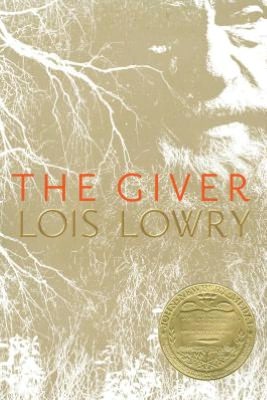I am the type of person (as I am sure many of you are) who always has a few carefully selected books in my suitcase when I go on vacation. This summer, when I spent a long weekend in Maine, I brought only one book: The Giver by Lois Lowry. Remember reading it in fifth grade English? I did too, vaguely, but with all of the hype surrounding the long-awaited, years-in-the-making film, I figured I would take the time to reread the slim volume. I thought it would make some nice light reading in between my boat rides and lighthouse tours. I certainly did not expect to end up sitting on a bench at the marina for hours on end, completely engrossed in a book that is purportedly for the twelve-to-seventeen–year-old set. I did not expect to be faced with the very essence of the human condition in a book I had been assigned in elementary school. And yet there I was, rescheduling my carefully planned activities to read a kids’ book.
Lois Lowry’s masterpiece centers on Jonas, a young boy who lives in a “perfect” world—there is no fear or pain, no sickness or war. Every person has their place and their family unit and their job in society and is satisfied with it. In their twelfth year, Jonas and all of his classmates are assigned the jobs that they will fill for the rest of their adult lives. However, instead of recreation director or nursing home attendant or something else normal, Jonas receives a special, once-in-a-generation position: he is to become the next Receiver of Memory. No one really knows exactly what this means, only that it is the most honored and revered position in all of society.
On the first day of his new, adult assignment, Jonas meets the old Receiver, who is now the Giver. The old, world-weary Giver explains to Jonas that he is the holder of all memory—he remembers things like war, anger, death, and heartbreak so that no one else has to. But he is also the only one in society that can see color or remember warmth or love or the exhilaration of sledding down a snow-covered hill on a crisp winter morning. All of these things have been removed from society in favor of sameness, order, and peace. The more memories Jonas is given, the more he realizes that the life he had been living was hollow. He had never known anger, but he had also never known love. He had never felt pain, but without pain and sadness, he had never really experienced joy. One night at dinner, Jonas asks his parents if they love him, and they are confused by the question. They say that they enjoy him and are proud of his accomplishments, but cannot truly say that they love him. Once Jonas realizes what is lost when choice, color, and emotion are lost to humanity, he and the Giver devise a brave and dangerous plan to give back the memories to all of society for good. But can Jonas really go through with it? Will the people be able to handle it?
The Giver is the kind of book where, after turning the last page, one just wants to sit quietly and digest it for a good long time. Honestly, I think I had pretty good reading comprehension when I was twelve, but I certainly don’t remember being as impacted by this book then as I am now. Jonas’s slow realization of what the lack of memory meant for his society was a deep and philosophical journey, for me, into what truly makes us human. The tagline of the new movie, delivered by a chillingly stone-faced Meryl Streep as the chief elder, is “When people have the freedom to choose, they choose wrong.” This is undeniably accurate: people choose war and violence and hatred. But without the ability to choose, they also can’t choose love or kindness. Without the ability to choose, we are less than human.
I came back from my vacation feeling renewed in more ways than one. To all of the adults out there who think that you are beyond reading a middle-school book, I want to challenge you to think again. Read The Giver . . . no, experience The Giver. It is an enriching and life-affirming and heartbreaking experience that will leave you with a new outlook on life and humanity and the mixture of joy and sorrow in your own experience. A pretty tall order for a book aimed at twelve-to-seventee-year-olds, huh? Well, in my opinion, The Giver is for all ages, all walks of life, all nations, everyone.








